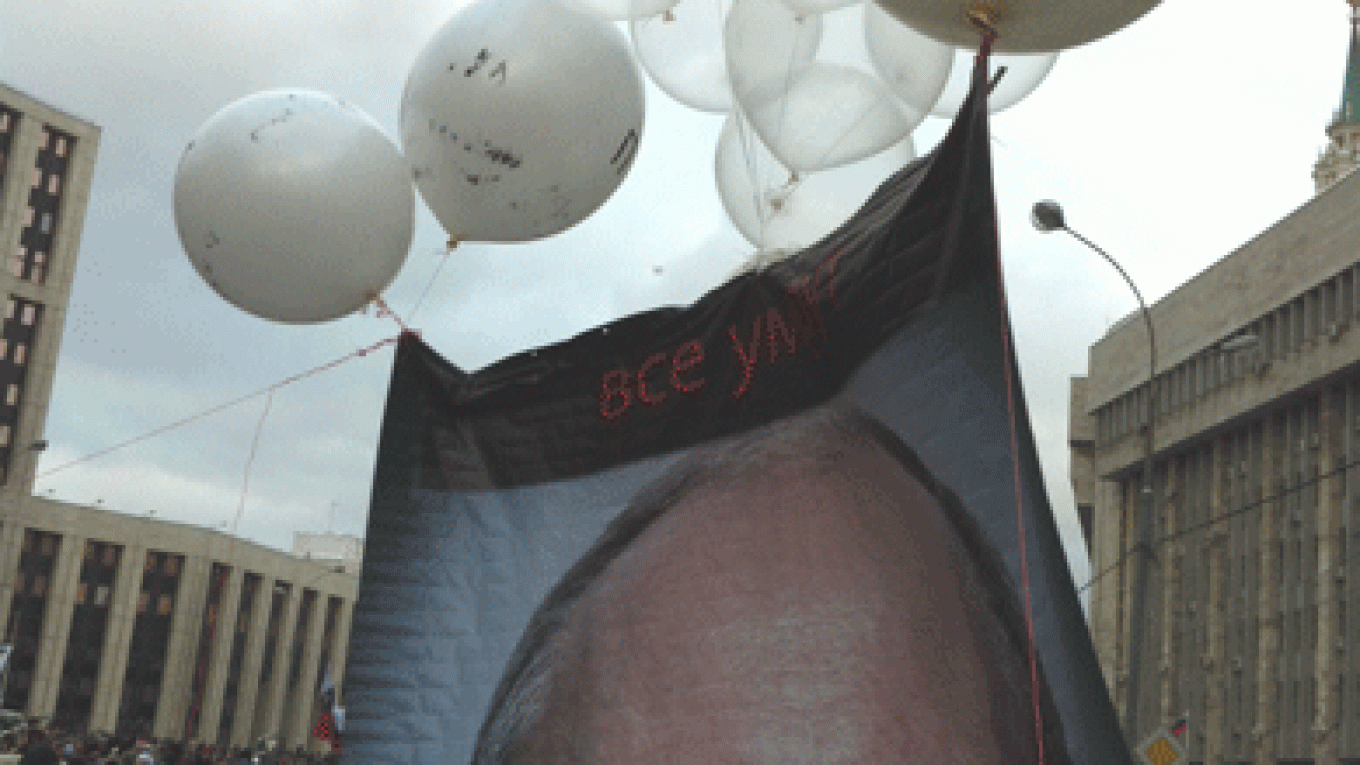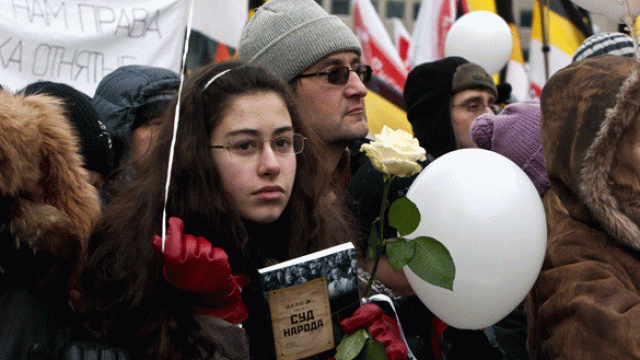The Saturday protest offered a cornucopia of political slogans, signs and posters. The Moscow Times spoke to people carrying some of the better ones about what they wanted to say and why.
Political activist Roman Dobrokhotov released a huge portrait of Prime Minister Vladimir Putin with the words "Everybody Dies But Me" and helium-filled balloons attached. The installation lifted into the air and flew up, up and away.
"All decent people came here today," Dobrokhotov said. "I think it is the most effective way to get Putin to leave."
"I hope that in March there will be a Velvet Revolution. Another couple of meetings, and there will be so many people that they won't leave until Putin goes," he said.
"People come up with ideas on their own. It is all spontaneous creativity," he explained about the posters at the rally. "I liked the slogan 'Let's bankrupt the State Department,'" he added, poking fun at the oft-cited but misguided allegation that the protesters were in the pay of U.S. authorities.
Pavel Maslyakov, 32, unemployed, carried a sign that said, "Putin and Teddy, Escape!"
"It is the second rally that I have been to in my life. It's the first time that I've made a banner. It is anger. I am angry at the system that is based on Putin," he said.
"Putin tries to frighten us by saying there will be chaos" without him, Maslyakov said. "[But] there are people up on stage who can take Putin's place," he said.
"I made it very quickly for 180 rubles at a copy center," he said about the sign. "They were frightened there, really. There are lots of people who are scared of saying what they think, scared of being sacked. I have nothing to be scared of."
"Why a teddy? It is Mr. Bean and a teddy," he explained, pointing at the teddy bear in the picture and referring to the British comic character. "That is [President Dmitry] Medvedev. He looks a lot like Medvedev."
Dmitry Balashov, 25, carried a sign saying, "Ded Moroz, give us wise and honest government please," and, in a smaller font at the bottom, "You know we've been good."
"We are tired of the lies that the authorities feed us. The federal channels showed that in one region there were 120, 140 percent of votes. After seeing that, there is no way you can't protest," said Balashov, who went to the first rally in his life on Dec. 10, when tens of thousands protested the outcome of the State Duma vote on Bolotnaya Ploshchad.
Many of them, like him, were also on Prospekt Akademika Sakharova on Saturday.
"We are law-abiding citizens," he said. "We do not want any revolution, we want evolution, an active change of the situation. What we have now is a political swamp. I think most people who are here share that view."
"There are a lot of people we know who did not come because they are scared. That says a lot. Their fear doesn't come from nowhere. That's why we came," Balashov said.
Dmitry Makarov, 27, an engineer, toted a stick with a small cartoon image of Putin stuck on the end.
"It's something that will attract people and get them to come and talk to me," he said about his minimalist design. "It is really interesting to speak to the people who come to the protest. I really like that. Last time I met an old lady who had been an [elections] observer and she said there really was falsification."
"We came because protesting is the only way to speak to the authorities. They don't understand any other way," Makarov said.
"There is the Internet now, and we can read about what is going on. I was at Bolotnaya Ploshchad and Chistiye Prudy, but before that I practically didn't go to protests. It's impossible to change things on your own, but this unification can get something done," he said, referencing the rally, which brought together everyone from militant anarchists to religious fundamentalists and LGBT activists.
Konstantin Ivanov, 28, an IT specialist, brought a long wooden stick without a poster. When asked about it, he explained, laughing, that he had to take down the poster because police had stopped him several times over it.
Law enforcement could perhaps be excused, because the poster had a take-off of the "I heart you" phrase: "I [a vaguely heart-shaped drawing of red male genitalia] the elections."
Ivanov said he came to the rally because he "didn't like the hypocrisy of authorities … and the future that they are preparing for me."
He added that he was at both protest rallies in December and posted stickers and participated in flash mobs around the city to promote the event on Prospekt Akademika Sakharova. He said he chose not to sit idle in between the events after his friends told him he wouldn't change anything by simply attending the rally.
Ivan Rodin, 29, an engineer, stood on a makeshift wooden stage away from the main stage and its loudspeakers and video screens.
"It is not the last protest, and it is important to show the rest of the population that we are not hired people," he said, also apparently disgruntled by accusations of being on the payroll of the U.S. State Department.
"It's the creative people, the most valuable people who bring the most money to the country. And we can catch their eye so that they will come to the next rally," Rodin said.
Liza, a 17-year-old schoolgirl, carried a life-size cutout of Soviet-era dissident and rights activist Andrei Sakharov, for whom the rally's venue is named.
"We are for clean elections for Andrei Sakharov. It took a week to make," she said. "He was a democrat. Do you want your photo taken with Sakharov?"
She declined to give her last name, possibly to avoid problems with teachers. Most of Moscow's high school students were supposed to be taking a sudden math test at the exact time of the rally on Saturday.
A man in a Guy Fawkes mask from the "V for Vendetta" movie held up a picture of Putin styled as Barack Obama's famous "Change" poster, but with the words "Disobey." He refused to speak.
Staff writer Natalya Krainova contributed to this report.
A Message from The Moscow Times:
Dear readers,
We are facing unprecedented challenges. Russia's Prosecutor General's Office has designated The Moscow Times as an "undesirable" organization, criminalizing our work and putting our staff at risk of prosecution. This follows our earlier unjust labeling as a "foreign agent."
These actions are direct attempts to silence independent journalism in Russia. The authorities claim our work "discredits the decisions of the Russian leadership." We see things differently: we strive to provide accurate, unbiased reporting on Russia.
We, the journalists of The Moscow Times, refuse to be silenced. But to continue our work, we need your help.
Your support, no matter how small, makes a world of difference. If you can, please support us monthly starting from just $2. It's quick to set up, and every contribution makes a significant impact.
By supporting The Moscow Times, you're defending open, independent journalism in the face of repression. Thank you for standing with us.
Remind me later.






